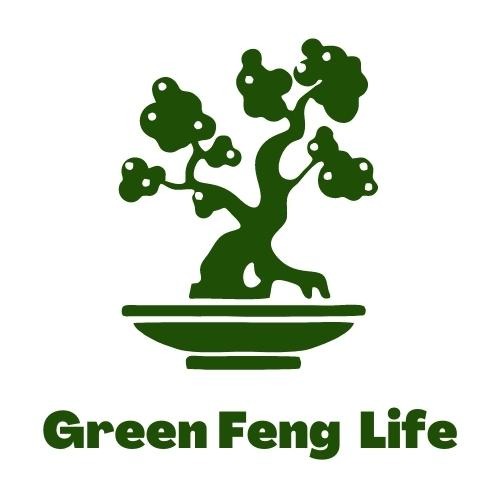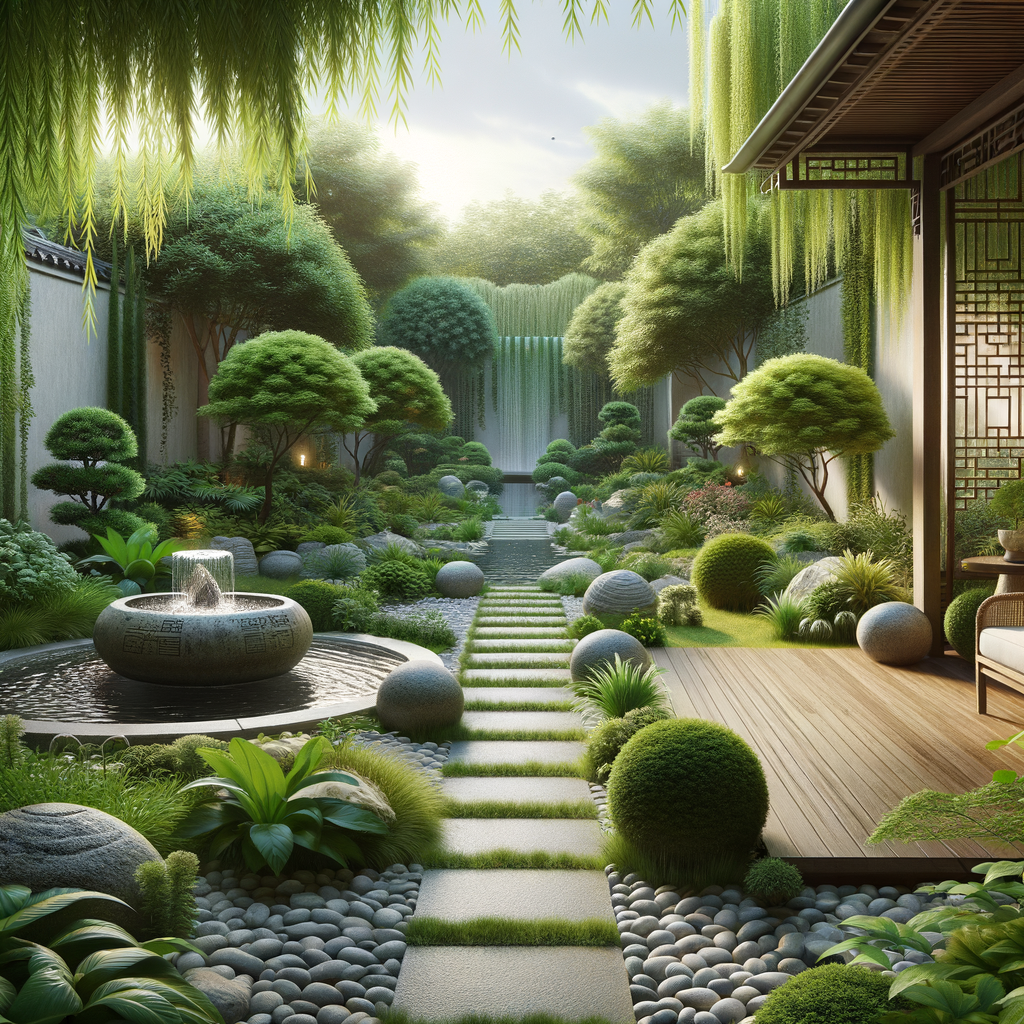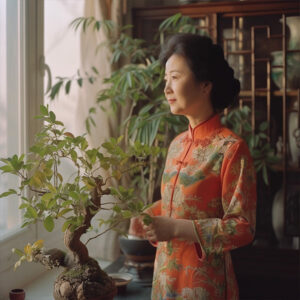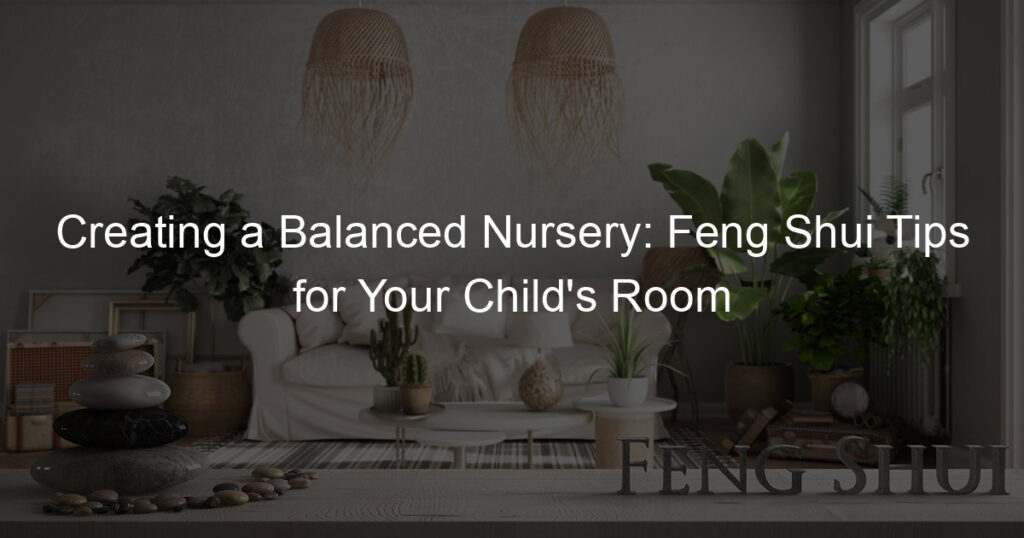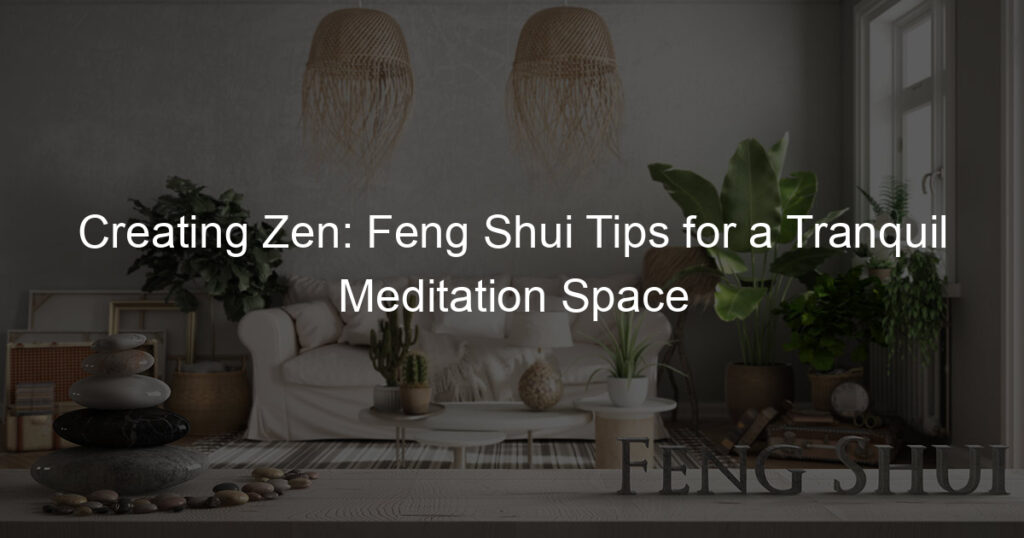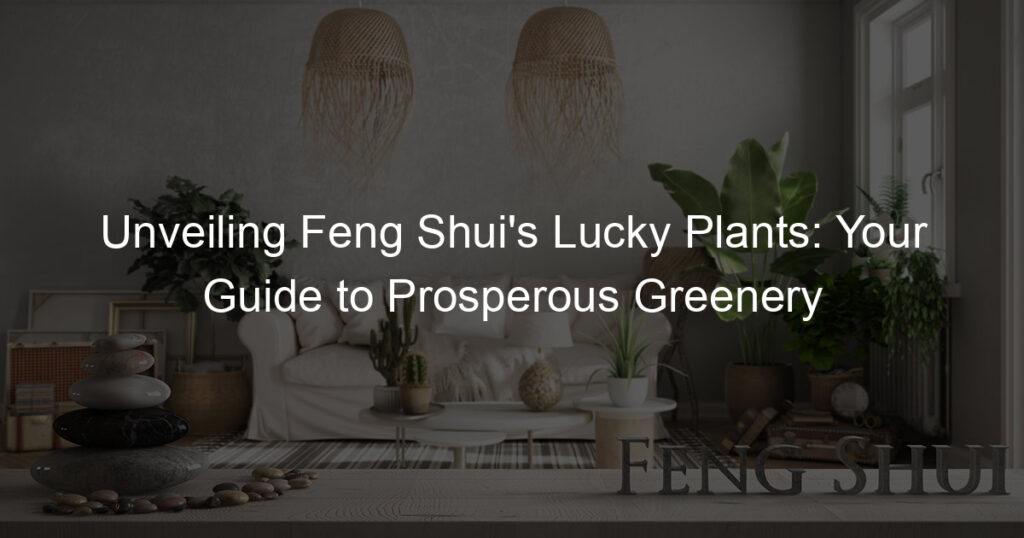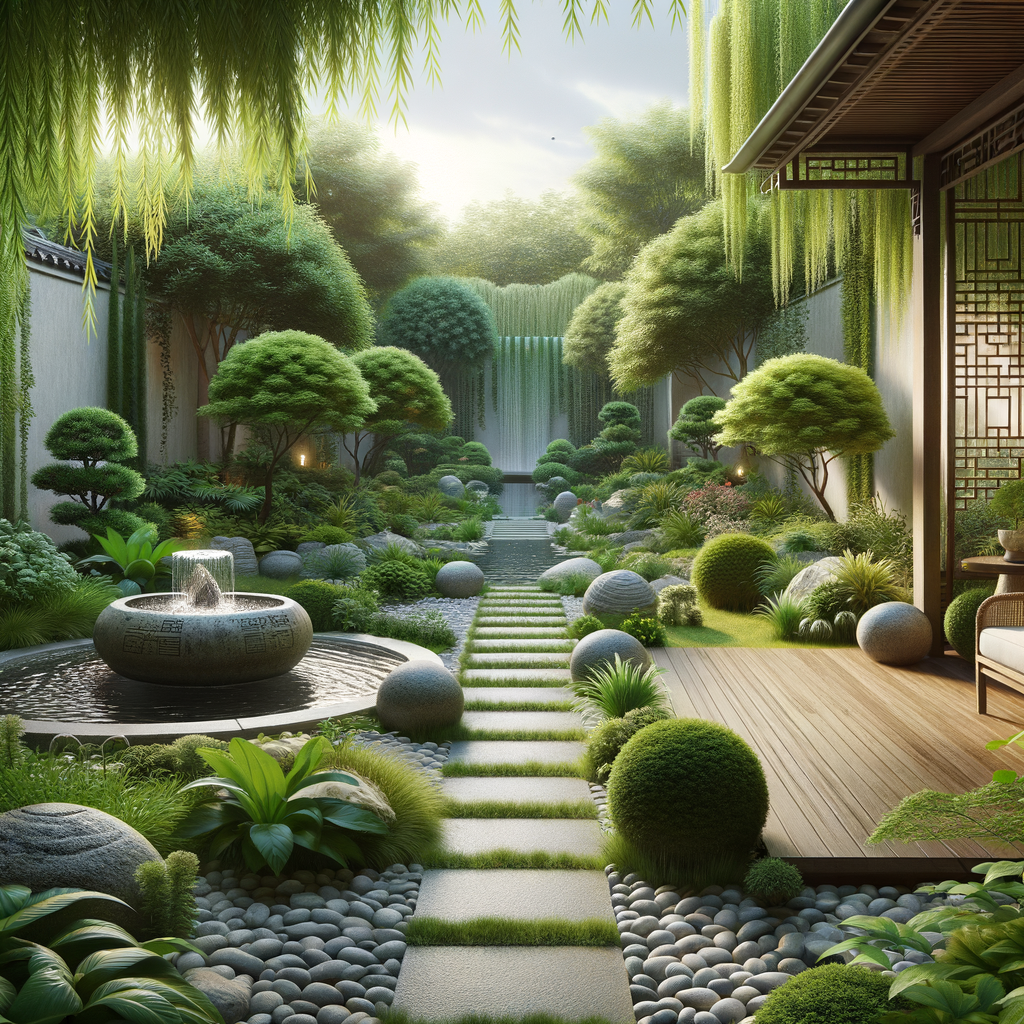
Introduction to Feng Shui Outdoor Tips
Creating a harmonious outdoor space can be a rewarding experience. One of the ways to achieve this is through the application of Feng Shui principles. This ancient Chinese art of placement can help you create an outdoor space that is not only visually appealing but also promotes positive energy flow. In this blog post, we will explore the concept of Feng Shui and its importance in outdoor spaces.
- Understanding the Concept of Feng Shui
- Importance of Feng Shui in Outdoor Spaces
Feng Shui, which translates to ‘wind and water’, is an ancient Chinese philosophy that seeks to promote harmony between individuals and their surrounding environment. It is based on the belief that all objects possess energy called ‘Chi’ and that by arranging these objects in a certain way, one can influence the flow of this energy. The goal of Feng Shui is to create a balance of this energy to promote health, happiness, and prosperity.
Outdoor spaces are an extension of our living spaces. They are where we connect with nature and find relaxation. Applying Feng Shui principles to these spaces can enhance their positive energy, making them more inviting and serene. A well-designed Feng Shui garden can promote relaxation, stimulate the senses, and even improve the home’s overall energy flow. It can also attract positive energy, repel negative forces, and create a sense of balance and harmony.
In the following sections, we will delve deeper into how you can transform your outdoor space using Feng Shui principles, essential Feng Shui tips for outdoor spaces, and how to design your outdoor space according to Feng Shui principles. We will also provide practical Feng Shui landscaping tips to help you create a garden that is not only beautiful but also promotes positive energy flow.
Transforming Outdoor Space with Feng Shui Principles
Creating a serene and balanced outdoor space is not only aesthetically pleasing but also promotes a sense of peace and tranquility. By applying Feng Shui principles, you can transform your garden into a harmonious sanctuary. Let’s delve into the world of Feng Shui garden design.
Feng Shui Garden Design
Feng Shui garden design is all about creating a balanced and harmonious environment. It involves careful selection and positioning of elements such as plants, water features, and stones. Here are some key steps to consider:
- Choosing the Right Plants
- Positioning of Water Elements
- Creating Balance with Stones and Rocks
Plants play a pivotal role in Feng Shui. They represent growth, prosperity, and positive energy. Choose plants with rounded leaves as they are believed to bring good luck. Also, consider the color of the plants. For instance, green represents health and balance, while red symbolizes fame and recognition.
Water is a powerful element in Feng Shui, symbolizing wealth and abundance. Position your water features such as fountains or ponds in the north, east, or southeast areas of your garden. These directions are believed to attract positive energy. Remember, the water should always be clean and flowing to represent a steady flow of wealth.
Stones and rocks in Feng Shui represent stability and strength. They can be used to create balance in your garden. Position larger rocks in the back of your garden to symbolize mountains, providing support and protection. Smaller stones can be used to create pathways, guiding the flow of energy through your garden.
By incorporating these Feng Shui principles, you can create a garden that is not only beautiful but also promotes a sense of peace and harmony. Remember, the key to a successful Feng Shui garden is balance and harmony among all elements.
Feng Shui Patio Layout
Creating a harmonious patio layout is a crucial aspect of outdoor Feng Shui. The arrangement of your patio furniture and the choice of colors can significantly impact the energy flow in your outdoor space. Let’s delve into these two key aspects:
- Arranging Furniture for Optimal Energy Flow
When it comes to arranging patio furniture, the goal is to promote a smooth and unobstructed flow of energy, or ‘Chi’. Start by positioning your furniture in a way that doesn’t block any entrances or pathways. This allows Chi to circulate freely.
Consider using a round or oval table, as these shapes encourage a smooth flow of energy. Avoid placing furniture in sharp corners or tight spaces, as this can create stagnant energy. Instead, aim for a balanced layout with ample space for movement.
Remember, the key is to create a comfortable and inviting space that promotes relaxation and social interaction.
- Choosing the Right Colors for Patio Decor
Color plays a vital role in Feng Shui as each color represents a different element and energy. For a harmonious patio, choose colors that align with the Feng Shui elements of Wood and Earth.
Wood elements can be represented by green and brown colors. These colors promote growth, vitality, and abundance. Consider incorporating these colors through plants, furniture, or decor items.
Earth elements are represented by yellow and beige colors. These colors create a sense of stability and nourishment. You can incorporate earth tones through your patio flooring, furniture, or decorative pieces.
Remember, balance is key in Feng Shui. So, while choosing colors for your patio decor, aim for a balanced mix that creates a harmonious and relaxing atmosphere.
By arranging your furniture for optimal energy flow and choosing the right colors for your patio decor, you can create a serene and harmonious outdoor space that aligns with Feng Shui principles.
Essential Feng Shui Tips for Outdoor Spaces
Feng Shui is not just about arranging your indoor spaces. It also plays a significant role in enhancing the energy of your outdoor spaces. Here are some essential tips to help you create a harmonious and positive energy flow in your outdoor spaces.
- Creating a Welcoming Entrance
- Using Wind Chimes for Positive Energy
- Importance of Cleanliness and Decluttering
The entrance of your home is the gateway for energy. A well-designed and welcoming entrance attracts positive energy and prosperity. Start by ensuring the path to your entrance is clear and free from obstacles. Use vibrant colors for your front door and consider adding plants or flowers to enhance the beauty and energy of the space.
Wind chimes are a popular Feng Shui tool used to attract positive energy. The soothing sounds of wind chimes create a peaceful and harmonious atmosphere. Hang them near your entrance or in your garden to enhance the flow of energy. Choose wind chimes made from metal, wood, or ceramic, as they are believed to bring different types of luck and blessings.
Cleanliness and decluttering are fundamental principles of Feng Shui. A clean and clutter-free space allows energy to flow freely. Regularly clean your outdoor spaces and remove any unnecessary items. This not only improves the visual appeal of your space but also promotes a positive and peaceful energy flow.
Implementing these Feng Shui tips can transform your outdoor spaces into a haven of tranquility and positivity. Remember, the key to successful Feng Shui is balance and harmony, so strive to create a space that feels good and supports your well-being.
Outdoor Feng Shui Principles
Creating an outdoor space that not only looks good but also feels good can be a challenging task. However, with the principles of Feng Shui, you can transform your backyard into a harmonious and balanced sanctuary. Let’s explore some key principles for a Feng Shui backyard transformation.
Feng Shui Backyard Transformation
Transforming your backyard using Feng Shui involves two main principles: creating a balance of the five elements and understanding the importance of privacy in backyard design.
- Creating a balance of the five elements
- Importance of privacy in backyard design
In Feng Shui, the five elements – Wood, Fire, Earth, Metal, and Water – are fundamental. Each element has a unique energy that can influence the overall feel of your space. A balanced backyard incorporates all these elements. For example, you can use wooden furniture (Wood), a fire pit (Fire), rocks or clay pots (Earth), metal sculptures (Metal), and a water feature or pond (Water). This balance fosters a sense of harmony and peace in your outdoor space.
Privacy is a crucial aspect of Feng Shui design. A private backyard is a peaceful backyard. You can create privacy by using fences, hedges, or trellises. These not only provide a sense of security but also help to block out negative energy from neighboring properties. Remember, a private backyard is a sanctuary where you can relax and rejuvenate without any disturbances.
In conclusion, transforming your backyard with Feng Shui principles involves creating a balance of the five elements and ensuring privacy. By incorporating these principles, you can create an outdoor space that is not only visually appealing but also promotes positive energy and tranquility.
Feng Shui Tips for Outdoor Space
Creating a harmonious outdoor space is not as difficult as it may seem. With a few simple Feng Shui tips, you can transform your garden or patio into a peaceful haven. Let’s explore two key principles: using mirrors to expand space and the importance of lighting.
- Using Mirrors for Expanding Space
Mirrors are a powerful tool in Feng Shui. They can create the illusion of a larger space and help to balance the energy flow. When placed correctly, mirrors reflect the beauty of nature and multiply the positive energy.
For instance, a mirror placed near a flower bed can double the visual impact of the blooms, creating a sense of abundance. It’s important to ensure that mirrors reflect pleasant views and not areas of clutter or decay. This way, they can effectively enhance the beauty and positive energy of your outdoor space.
- Importance of Lighting in Outdoor Spaces
Lighting plays a crucial role in Feng Shui. It not only illuminates the space but also attracts positive energy. Good lighting can make your outdoor areas feel warm, inviting, and safe.
Consider using solar lights along pathways, or hang lanterns from trees for a magical effect. You can also use spotlights to highlight special features like a beautiful tree or water feature. Remember, the goal is to create a balance. Too much light can be overwhelming, while too little may result in areas of darkness and stagnation.
| Feng Shui Element | Application |
|---|---|
| Mirrors | Create the illusion of a larger space, reflect beauty, and multiply positive energy. |
| Lighting | Attract positive energy, make outdoor areas feel warm, inviting, and safe. |
In conclusion, using mirrors and lighting effectively can greatly enhance the Feng Shui of your outdoor space. Remember, the key is to create a balance and harmony with nature. Happy decorating!
Feng Shui Outdoor Space Design
Designing an outdoor space using Feng Shui principles can bring harmony and peace to your environment. In this section, we will explore two key areas where Feng Shui can be applied: creating a harmonious outdoor dining area and designing a peaceful meditation space.
-
Creating a Harmonious Outdoor Dining Area
Imagine enjoying a meal outdoors, surrounded by the beauty of nature and the calming influence of a well-designed space. This is what a Feng Shui outdoor dining area can offer. The key to achieving this is balance. The five elements of Feng Shui – wood, fire, earth, metal, and water – should be represented in your outdoor dining area to create a harmonious environment.
For instance, a wooden dining table represents the wood element, while a fire pit or candles can represent the fire element. Potted plants or a nearby garden can symbolize the earth element, metal patio furniture or decorations can represent the metal element, and a water feature or pond can symbolize the water element. By incorporating these elements, you can create a balanced and harmonious outdoor dining area.
-
Designing a Peaceful Meditation Space
Creating a peaceful meditation space in your garden using Feng Shui principles can provide a sanctuary for relaxation and reflection. The key is to choose a quiet spot in your garden that is not directly in line with the entrance of your home. This spot should be shielded from distractions and have a good view of the garden or sky.
Consider adding a water feature for its calming sound and symbol of serenity. Use natural materials like stone or wood for seating. Plant lush, green plants for a sense of life and growth. And finally, add a personal touch, like a statue or wind chimes, to make the space truly your own. By following these tips, you can create a peaceful meditation space that promotes tranquility and mindfulness.
Remember, the goal of Feng Shui is to create a balanced and harmonious environment. By applying these principles to your outdoor spaces, you can enhance your connection with nature and create areas that promote relaxation and enjoyment.
Feng Shui Landscaping Tips
One of the most crucial aspects of Feng Shui landscaping is choosing the right plants. Plants play a significant role in creating a balanced and harmonious environment. Let’s explore how to select the best plants for your Feng Shui garden.
Choosing the Right Plants
When it comes to Feng Shui, not all plants are created equal. Some plants can attract positive energy, while others can disrupt the balance of your space. Here are some tips to help you choose the right plants for your Feng Shui garden.
- Plants that attract positive energy
- Plants to avoid in Feng Shui
Plants that have rounded leaves are considered to be good luck in Feng Shui. This includes plants like the jade plant, money plant, and rubber plant. These plants are believed to attract positive energy and prosperity. They are also easy to care for, making them a great choice for beginners.
On the other hand, plants with thorns or sharp leaves should be avoided in Feng Shui. This includes plants like cacti and certain types of succulents. These plants are thought to disrupt the flow of positive energy. If you already have these plants in your garden, consider moving them to a less central location.
Remember, the most important thing in Feng Shui is balance. So, try to have a mix of different types of plants in your garden. This will help create a balanced and harmonious environment.
Choosing the right plants for your Feng Shui garden can be a fun and rewarding experience. With the right knowledge and a little bit of patience, you can transform your outdoor space into a serene and balanced sanctuary.
Positioning of Landscape Elements
When it comes to Feng Shui landscaping, the positioning of various elements in your outdoor space plays a crucial role. This includes the placement of trees and large plants, as well as the creation of a balance with water features. Let’s delve into these aspects in more detail.
- Placement of Trees and Large Plants
Trees and large plants are significant elements in Feng Shui landscaping. They represent growth, stability, and prosperity. However, their placement is key to harnessing these positive energies. Trees should be positioned in the east or southeast areas of your garden, as these directions are associated with health and wealth in Feng Shui. Avoid planting large trees too close to your home as they can block the flow of positive energy.
When it comes to large plants, they should be placed in a way that they don’t obstruct paths or entrances. They should also be well-maintained to ensure they don’t become sources of negative energy. Remember, in Feng Shui, a healthy plant is a symbol of thriving energy.
- Creating a Balance with Water Features
Water features like ponds, fountains, or birdbaths can be a beautiful addition to your garden. In Feng Shui, water is considered a symbol of wealth and prosperity. However, it’s essential to create a balance with these features.
Water features should be placed in the north, east, or southeast areas of your garden. These directions are known to attract prosperity and good luck. The water should be kept clean and flowing, as stagnant water can attract negative energy. Also, the size of the water feature should be proportional to the size of your garden to maintain balance.
Remember, the key to successful Feng Shui landscaping is to create a harmonious balance between all elements. This not only enhances the aesthetic appeal of your outdoor space but also promotes the flow of positive energy.
Conclusion: Revamping Your Garden with Feng Shui
In this guide, we’ve explored the ancient art of Feng Shui and how it can transform your outdoor spaces. Now, let’s recap the key points and inspire you to create your own Feng Shui garden.
- Recap of Feng Shui tips for outdoor spaces:
- Encouragement for personal creativity in design:
We’ve discussed various Feng Shui principles and how they can be applied to your garden. Remember to balance the five elements – Wood, Fire, Earth, Metal, and Water. Use plants and objects that represent these elements and arrange them in a way that promotes harmony and balance. Don’t forget about the Bagua map, which can guide you in placing different elements in specific areas of your garden.
While Feng Shui provides a framework, it doesn’t limit your creativity. Feel free to experiment with different plants, colors, and arrangements. The most important thing is that your garden should reflect your personality and bring you joy. As the famous Feng Shui expert Lillian Too once said, “The main purpose of Feng Shui is to create environments where the people living and working in them are comfortable and at ease.”
With these tips in mind, you’re now ready to revamp your garden with Feng Shui. Remember, the journey to a harmonious garden is a process, not an event. Take your time, enjoy the process, and watch as your outdoor space transforms into a serene and balanced sanctuary.
